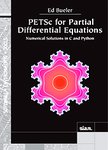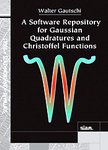版权所有:内蒙古大学图书馆 技术提供:维普资讯• 智图
内蒙古自治区呼和浩特市赛罕区大学西街235号 邮编: 010021
T=题名(书名、题名),A=作者(责任者),K=主题词,P=出版物名称,PU=出版社名称,O=机构(作者单位、学位授予单位、专利申请人),L=中图分类号,C=学科分类号,U=全部字段,Y=年(出版发行年、学位年度、标准发布年)
AND代表“并且”;OR代表“或者”;NOT代表“不包含”;(注意必须大写,运算符两边需空一格)
范例一:(K=图书馆学 OR K=情报学) AND A=范并思 AND Y=1982-2016
范例二:P=计算机应用与软件 AND (U=C++ OR U=Basic) NOT K=Visual AND Y=2011-2016

The Portable, Extensible Toolkit for Scientific Computation (PETSc) is an open-source library of advanced data structures and methods for solving linear and nonlinear equations and for managing discretizations. This book uses these modern numerical tools to demonstrate how to solve nonlinear partial differential equations (PDEs) in parallel. It starts from key mathematical concepts, such as Krylov space methods, preconditioning, multigrid, and Newton's method. In PETSc these components are composed at run time into fast solvers.
Discretizations are introduced from the beginning, with an emphasis on finite difference and finite element methodologies. The example C programs of the first 12 chapters, listed on the inside front cover, solve (mostly) elliptic and parabolic PDE problems. Discretization leads to large, sparse, and generally nonlinear systems of algebraic equations. For such problems, mathematical solver concepts are explained and illustrated through the examples, with sufficient context to speed further development.
PETSc for Partial Differential Equations
addresses both discretization and fast solvers for PDEs;
emphasizes practice more than theory;
contains well-structured examples, with advice on run-time solver choices;
demonstrates how to achieve high performance and parallel scalability; and
builds on the reader's understanding of fast solver concepts when applying the Firedrake
Python finite element solver library in the last two chapters.
This textbook, the first to cover PETSc programming for nonlinear PDEs, provides an on-ramp for graduate students and researchers to a major area of high-performance computing for science and engineering. It is suitable as a supplement for courses in scientific computing or numerical methods for differential equations.

This companion piece to the author's 2018 book, A software Repository for Orthogonal Polynomials, focuses on Gaussian quadrature and the related Christoffel function. The book makes Gauss quadrature rules of any order easily accessible for a large variety of weight functions and for arbitrary precision. It also documents and illustrates known as well as original approximations for Gauss quadrature weights and Christoffel functions.
The repository contains 60+ datasets, each dealing with a particular weight function. Included are classical, quasi-classical, and, most of all, nonclassical weight functions and associated orthogonal polynomials.
Scientists, engineers, applied mathematicians, and statisticians will find the book of interest.
电话和邮箱必须正确填写,我们会与您联系确认。
版权所有:内蒙古大学图书馆 技术提供:维普资讯• 智图
内蒙古自治区呼和浩特市赛罕区大学西街235号 邮编: 010021

暂无评论